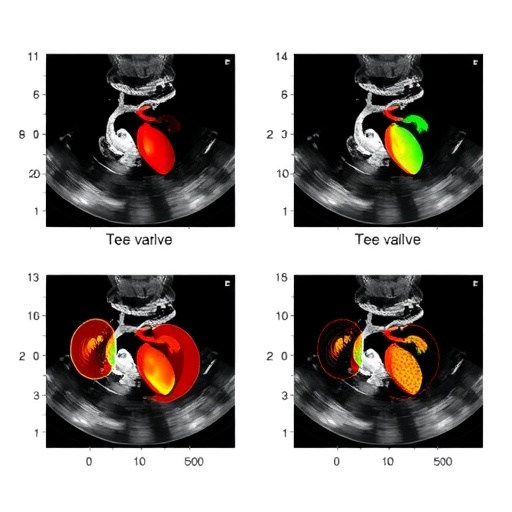In a groundbreaking study published in BMC Pediatrics, researchers have unveiled significant insights into the intricate relationship between asthma severity and biventricular cardiac function in children. The study, led by a team including Elmeazawy, Razaky, and El Amrousy, employs cutting-edge echocardiographic modalities to elucidate how varying levels of asthma severity can impact the heart’s operation in pediatric patients. This research highlights the need for attentive cardiac assessment in asthmatic children, who may be at a higher risk of cardiovascular complications due to their respiratory condition.
Asthma, a prevalent chronic respiratory ailment affecting millions of children worldwide, is characterized by inflammation and narrowing of the airways, leading to difficulty in breathing. The inherent relationship between chronic respiratory diseases and cardiac function has garnered increasing interest in the medical community. The question arose: could varying levels of asthma severity influence biventricular function? To address this, the researchers embarked on a comprehensive investigation that sought to bridge the gap between respiratory challenges and cardiovascular health in a vulnerable patient population.
Utilizing advanced echocardiographic techniques, the team assessed biventricular function, which is crucial for maintaining a healthy circulatory system. These modalities, including two-dimensional and three-dimensional echocardiography, allow for detailed visualization and measurement of cardiac structures and their functionality. By applying these technologies, the researchers methodically evaluated the left and right ventricles’ performance, providing a holistic understanding of cardiac dynamics in children with asthma.
The methodology employed in this study was meticulous. Participants were classified based on asthma severity—mild, moderate, and severe—allowing for a comparative analysis of cardiac function across groups. Each child underwent a series of echocardiograms to capture the nuances of biventricular dynamics. By correlating these echocardiographic findings with clinical parameters and asthma severity, the research team aimed to elucidate how asthma influences cardiac health in children.
One of the pivotal findings of the study was the observation of reduced biventricular function in children with severe asthma compared to their counterparts with milder forms of the condition. This revelation underscores the importance of routine cardiac evaluations in asthmatic children, particularly those experiencing more significant respiratory distress. The data suggests that prolonged exposure to respiratory stress may have a deleterious effect on myocardial performance, showcasing a potential link that warrants further investigation.
Furthermore, the study shed light on the mechanisms that underpin the relationship between respiratory function and cardiovascular health. Chronic hypoxia—a condition often associated with severe asthma—can lead to alterations in the cardiac structure and function. The researchers posited that the heart’s response mechanisms to reduced oxygen levels may contribute to diminished biventricular performance, lighting the path for future studies exploring therapeutic interventions that could mitigate these adverse effects.
An essential aspect of this research is how it translates into clinical practice. By integrating these findings into pediatric care protocols, healthcare providers can develop targeted cardiovascular assessments for asthmatic children. Early identification of impaired biventricular function may lead to timely interventions, thereby improving overall patient outcomes. The authors advocate for incorporating regular cardiac evaluations into the standard management of patients with asthma, particularly those with severe manifestations of the disease.
In addition to clinical implications, this study raises broad questions about the intersection of respiratory health and cardiovascular disease in children. As the prevalence of asthma continues to rise globally, understanding its multifaceted impact is more critical than ever. The potential long-term consequences of untreated or poorly managed asthma extend beyond the lungs, highlighting an urgent need to prioritize comprehensive care strategies that encompass both respiratory and cardiovascular health.
Moreover, the researchers’ commitment to employing innovative echocardiographic techniques marks a significant advancement in pediatric cardiology. These modalities not only provide a clearer picture of heart function but also open avenues for further research into cardiac conditions associated with other chronic illnesses. The enthusiasm surrounding these findings may pave the way for collaborative studies that explore the broader implications of commonly co-occurring conditions among children, ultimately improving patient quality of life.
As with any groundbreaking research, the study also underscores the necessity for ongoing investigations to reinforce the association between asthma severity and cardiac function. Future studies could delve deeper into elucidating the cellular and molecular mechanisms at play and explore how various therapeutic interventions—such as inhaled corticosteroids or bronchodilators—might influence biventricular performance in this unique population.
In conclusion, the evaluation of biventricular function in asthmatic children by Elmeazawy et al. is a pivotal step forward in understanding the intricate interplay between respiratory and cardiovascular health. The findings advocate for an integrated approach to managing asthma, where pediatricians must assess not only the lung function but also the heart’s performance. This comprehensive perspective may ultimately enhance patient care and lead to better health outcomes for children battling asthma globally. As the research community continues to explore the ramifications of respiratory diseases on overall health, studies like this will undoubtedly serve as foundational building blocks for future advancements in pediatric medicine.
Subject of Research: Evaluation of biventricular function in asthmatic children with different severity.
Article Title: Evaluation of biventricular function in asthmatic children with different severity by new echocardiographic modalities.
Article References: Elmeazawy, R., Razaky, O.E., El Amrousy, D. et al. Evaluation of biventricular function in asthmatic children with different severity by new echocardiographic modalities. BMC Pediatr 25, 677 (2025). https://doi.org/10.1186/s12887-025-06028-2
Image Credits: AI Generated
DOI: 10.1186/s12887-025-06028-2
Keywords: Asthma, biventricular function, echocardiographic modalities, pediatric cardiology, chronic respiratory diseases.
Tags: advanced imaging in pediatric cardiologyasthma management in childrenbiventricular function assessmentcardiovascular complications in asthmatic patientschronic respiratory diseases and cardiac impactechocardiographic techniques in childreninnovative echocardiographic modalitiespediatric asthma and heart healthpediatric cardiovascular health assessmentrelationship between asthma severity and heart functionrespiratory conditions and cardiovascular risksunderstanding biventricular function in asthmatic kids





